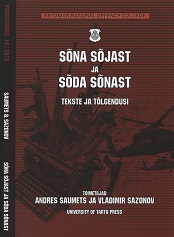Sõjaväeline kirjaoskus
Military Literarcy
Author(s): Peeter KukkSubject(s): Education
Published by: Kaitseväe Ühendatud Õppeasutused
Summary/Abstract: As military commanders, officers should have mastery of specialised military literacy, i.e. they should know how to formulate operation orders and have knowledge of the following: the language of communication, the basics of the decision-making process, tactical and technical capabilities of weaponry, electronic communication rules and other sign systems. The obligatory military sign systems include ranks insignia, different military symbols on digital and paper maps, warning signals, markings of ammunitions, technical drawings, graphics, and etc. The acquisition of military literacy in conjunction with good leadership skills requires hard work and time both while being enrolled at an academy and in subsequent everyday service in the armed forces. A perfect knowledge and unambiguous understanding of military literacy will significantly speed up the decision-making process, facilitate the formulation of a commander’s intent, promote cooperation and in the long run, save lives. This article analyses changes in a military leader’s command power and his chain of command that have been brought about by the development of military technology. The implementation of mission command principles into the military command chain can be regarded as a qualitative change in the formulation of the commander’s intent. In order to highlight the importance of military education and training, a short overview of the history of military education in Europe is provided together with an analysis of the differences between war preparations of the Soviet and German armies during the Second World War, and of the Israeli and Egyptian/Syrian armies during the Yom Kippur War. Nowadays it is highly improbable that a military conflict will break out between developed countries with formed front lines and a high concentration of armed forces, as was the case in previous world wars. Armies are increasingly more involved in international operations, such as missions in Bosnia and Herzegovina, Kosovo, Iraq, Afghanistan and certain countries in Africa. These missions are conducted with a common fixed purpose and results are achieved by conducting operations on a smaller scale. To prevent insurgent actions of smaller units one must leave fortified camps and go into distant villages and attempt to obtain the confidence and support of local people when completing missions. The execution of such tasks which garner support from the civil population is inevitably accompanied by an augmentation of the role of lower lever commanders; the duties and responsibility of the latter will increase, as will the opportunities to make independent decisions.
Journal: KVÜÕA toimetised
- Issue Year: 2012
- Issue No: 16
- Page Range: 118-141
- Page Count: 24
- Language: Estonian

